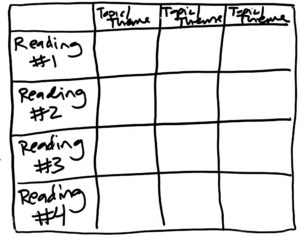Argh! It’s annoying having to prep for timed essays when you don’t know the prompt, isn’t it?
Recently I got this GREAT question from a student who stumbled across my videos on YouTube:
A junior in college named Yaya asked, “I have a timed essay coming up in January and don’t know the prompt. However, I do have the readings which are 4 different articles, and all kinda surround Angela Duckworth’s idea of Grit. Any ideas on how I can prepare for such essay??”
Yes! I DO have an idea. Watch the video for my complete answer to Yaya.
Hey there, don’t have time for the full video? No worries, I’ve got your back, here’s a summary:
The problem we’re looking at this week is how do you prepare for an essay when you don’t know what the prompt will be? For Yaya, this was causing her stress, and that’s completely understandable, after all, how do you prepare for something when you don’t know what you’re preparing for?
Well, the first thing we can do is look at the 4 articles she was assigned to read. We can note that they all revolve around Grit, and there are some themes we can see right away just from reading the subtitles, such as “The limits of grit”, “Is grit overrated?”, “how grit helps with perseverance and passion for long-term goals”, etc. So when you start reading you should be looking for these themes and marking down stuff like, when is their passion showing up, what are some limits to grit, when are long-term goals brought up, etc.

Then I’d create a chart like the one above. I’d list each of the readings and the themes, and I’d annotate every time I found the themes and I’d fill out the boxes. This way, I have a good understanding of the building blocks of each of these articles. Once you understand the core themes of the articles you should be very well prepared to write any essay on these readings.
An added step you could take is to consider or ask others, what some potential essay prompts from these articles could be, and then practice making an outline for them. Just from reading the titles and the subject matter, I could make an educated guess that one potential prompt they would give you is, “Analyze Grit, is it a good thing? If so why or why not?”
I hope this is helpful to you all, and if you want more tips like this, click here to check out my course which has a lot of tips for preparing for essays.
